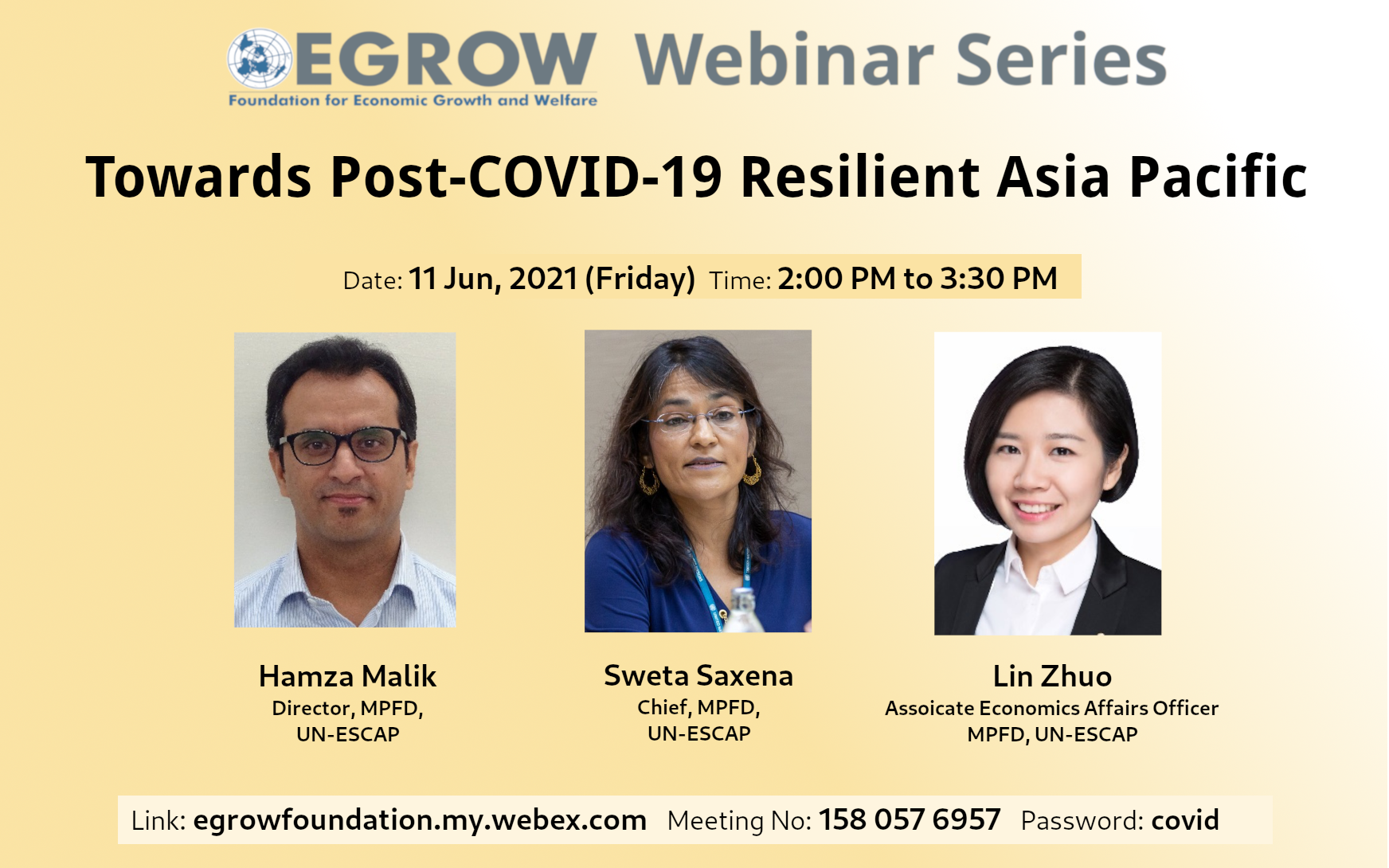Towards Post-Covid-19 Resilient Asia Pacific

Webinar LInk
Meeting No: 158 057 6957
Password: covid
Abstract
The COVID-19 pandemic has exposed chronic development fault lines in Asia and the Pacific, taking a heavy toll on the social and economic well-being of the region’s people. Slow regional progress in implementing the transformative 2030 Agenda for Sustainable Development has done little to reduce wide gaps in social services, digital access and green development, and that has exacerbated the vulnerability to such shocks.
The pandemic caused unprecedented socioeconomic disruptions in Asia and the Pacific. Working- hour losses totalled the equivalent of 140 million full-time jobs in 2020, while prolonged school closures severely affected education. Taken together, these distortions are likely to have considerable adverse effects on human capital accumulation and productivity. The poor and vulnerable groups were disproportionately affected, resulting in a surge in poverty and a widening of inequality gaps. ESCAP estimates that an additional 89 million people in the region could have been pushed back into extreme poverty at the $1.90 per day threshold, erasing years of progress in poverty reduction.
The haphazard and less-than-adequate response by Governments to such a shock highlights the urgency to rethink economic policymaking, which has so far been focused primarily on economic growth, neglecting critical investments in people and in building resilience. In this presentation the authors takes stock of the socioeconomic fallout from the current pandemic and looks at past economic and non-economic shocks that have inflicted damage on the region’s sustainable development prospects in order to draw lessons on how to build forward better during the post-pandemic recovery. It presents the contours of policy packages that are needed in this regard and analyses the impact of implementing them across the economic, social and environmental dimensions of sustainable development.
About the Speakers
Hamza Malik
Hamza Malik, currently the Director of Macroeconomic Policy and Financing for Development Division (MPFD) at UN-ESCAP, leads the team responsible for analyzing economic conditions and emerging development challenges in Asia-Pacific economies, and assesses potential policy options and financing strategies that can support them in their pursuit of the 2030 Agenda for Sustainable Development. Under his guidance, the division publishes two annual flagship publications – the Economic and Social Survey of Asia and the Pacific and the Asia-Pacific Countries with Special Needs Development Report – and an edited analytical book, once in two years, on selected Financing for Development issues. Hamza is also the chief editor of ESCAP’s academic journal, the Asia-Pacific Sustainable Development Journal, and supervises the publication of working papers and policy briefs on various economic and financing issues
Before joining the UN-ESCAP in 2014, Hamza worked as the Director of Monetary Policy Department at the central bank of Pakistan (SBP), and before that he was an assistant professor in the Department of Economics at Lakehead University, Canada. He graduated from McMaster University with a PhD in economics in 2002.
Sweta Saxena
Sweta C. Saxena is currently on leave from the IMF to serve as the Chief in the Macroeconomic Policy and Financing for Development Division at the UN Economic and Social Commission for Asia and the Pacific (UNESCAP) in Bangkok, Thailand. She has led 3 flagship reports at ESCAP: 2019 "Ambitions beyond growth", 2020 "Towards sustainable economies", and 2021 “Towards post-COVID-19 resilient economies.” At the IMF, she has worked on multilateral surveillance for the G20 countries in the Research Department and on fragile countries in the African Department.
Her research has focused on policy-relevant macro-financial issues, namely, crises and recoveries, contagion, and exchange rates. Her more recent work focuses exclusively on sustainable development. Sweta has published extensively, including in the American Economic Review, Journal of Economic Literature and the Journal of International Economics.
Prior to joining the IMF, she worked at the Bank for International Settlements in Basel, Switzerland, and as an Assistant Professor at the University of Pittsburgh. Sweta obtained her PhD in economics from the University of Washington and an M.A. in Economics from the Delhi School of Economics.
Lin Zhuo
Lin Zhuo has worked as the Associate Economic Affairs Officer in the Macroeconomic Policy and Financing for Development Division at the UN Economic and Social Commission for Asia and the Pacific (UNESCAP) since late 2020. She has been part of the drafting team for the Survey. She is a Chartered Financial Analyst. Before joining ESCAP, she worked for the UN in New York. Before joining UN, she worked for various financial institutions in Hong Kong. Lin obtained her master in investment management from the Hong Kong University of Science and Technology.